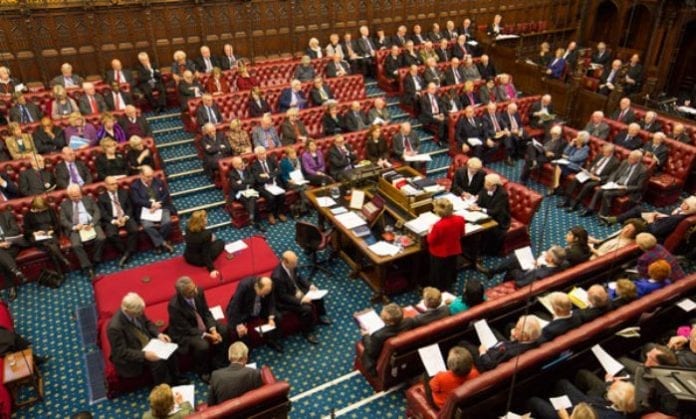GOVERNMENT IS FAILING RURAL COMMUNITIES, LORDS COMMITTEE FINDS
– Committee recommends rural affairs should be transferred from Defra to Ministry for Housing, Communities and Local Government –
OVER THE COURSE OF 12 YEARS THE GOVERNMENT HAS DIMINISHED THE RESOURCES GIVEN TO DEPARTMENTS AND BODIES WHICH PROTECT THE UK’S NATURAL ENVIRONMENT AND PROMOTE THE NEEDS OF RURAL COMMUNITIES. THIS HAS HAD A PROFOUND, NEGATIVE IMPACT ON ENGLAND’S BIODIVERSITY AND THE SOCIAL AND ECONOMIC WELFARE OF RURAL AREAS, AND MUST BE REVERSED. THIS IS JUST ONE OF THE FINDINGS FROM A HOUSE OF LORDS COMMITTEE’S SCRUTINY OF THE NATURAL ENVIRONMENT AND RURAL COMMUNITIES ACT 2006 (NERC ACT).
The Committee highlight that independent bodies created by the NERC Act, such as the Commission for Rural Communities, have been abolished and their loss has significantly weakened the Government’s understanding of rural society, leading to policy changes that fail to account for the negative impacts for people in rural communities.
The Committee also found that there has been a consistent failure, over a number of years to prioritise the ‘rural affairs’ element of the departmental remit of Defra. The focus of the department has been consumed by its work on agriculture and the environment and this will only intensify as a result of Brexit. The lives of those who live in the countryside have been neglected as a result.
THE COMMITTEE THEREFORE RECOMMEND THAT RESPONSIBILITY FOR RURAL POLICY SHOULD BE TRANSFERRED FROM DEFRA TO THE MINISTRY FOR HOUSING, COMMUNITIES AND LOCAL GOVERNMENT, WHO ALREADY DELIVER MANY OF THE KEY SERVICES THAT SUPPORT RURAL VITALITY.
Natural England – the organisation created by the Act and charged with protecting, enhancing and promoting the natural environment – has lost its independence and influence, and has insufficient resources to deliver its full range of environmental objectives. This is due to persistent funding cuts and increasing central control, which are limiting its ability to fulfil its general purpose. Key tasks, such as the promotion of public access to the countryside and the protection of important landscapes, are being diminished as a result.
THE GOVERNMENT MUST ADDRESS THIS SITUATION URGENTLY AND THE COMMITTEE RECOMMENDS THAT NATURAL ENGLAND SHOULD BE PROPERLY RESOURCED SO IT CAN DELIVER EFFECTIVELY ITS FULL RANGE OF STATUTORY DUTIES AND RESPONSIBILITIES.
Section 40 of the Act states that any public authority “must have regard to the purpose of conserving biodiversity”, but the evidence received by the Committee suggests that this biodiversity duty has been ineffective, and the state of biodiversity continues to decline with the Government not taking enough action to promote awareness and understanding of the duty. THE COMMITTEE RECOMMEND THAT THE GOVERNMENT SHOULD INTRODUCE NEW REPORTING REQUIREMENTS AND CONSIDER CHANGES TO THE WORDING OF THIS DUTY, AS IT IS CURRENTLY WEAK AND UNENFORCEABLE.
LORD CAMERON OF DILLINGTON, CHAIRMAN OF THE COMMITTEE, SAID:
“It is clear that the Government are failing to take proper account of the needs of rural communities. Departmental decisions and policies continue to demonstrate a lack of rural understanding among Whitehall policymakers. Each and every Government department should be required to think about the ways in which their policies affect rural people, and the Government must take action to ensure that this ‘rural-proofing’ of policy happens.
“The Committee also heard concerning evidence of the ongoing decline of biodiversity, species and habitats. The 2006 Act, which created Natural England and introduced a new biodiversity duty, was supposed to address this, but has failed to do so. The biodiversity duty suffers from weak wording and poor enforceability, whilst Natural England’s status has been diluted and weakened over recent years, so that it now struggles to perform all of its key functions. The Government needs to act now, before our natural environment, protected species and cherished landscapes suffer further damage.
“The Committee’s overall vision is for balanced protection and promotion of the natural environment and a reversal of the biodiversity decline.
This must be coupled with better recognition of the potential of rural communities and the rural economy, and a greater effort from the Government to ensure that policy changes do not work to the detriment of rural areas.
EMBARGOED COPIES OF THE REPORT ARE AVAILABLE TO THE MEDIA FROM THE LORDS PRESS OFFICE ON WEDNESDAY 21STMARCH, EMBARGOED UNTIL 00:01 ON THURSDAY 22ND MARCH.
TO REQUEST A COPY, OR BID FOR AN INTERVIEW WITH LORD CAMERON OF DILLINGTON, THE CHAIRMAN OF COMMITTEE, PLEASE EMAIL LORDSPRESSOFFICE@PARLIAMENT.UK OR CALL 020 7219 8535.
Help keep news FREE for our readers
Supporting your local community newspaper/online news outlet is crucial now more than ever. If you believe in independent journalism, then consider making a valuable contribution by making a one-time or monthly donation. We operate in rural areas where providing unbiased news can be challenging. Read More About Supporting The West Wales Chronicle

























